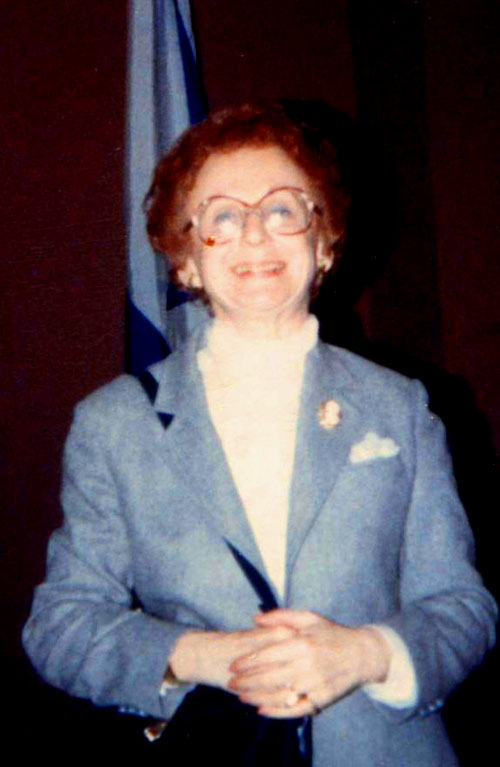Mrs. DOROTHY HIRSCH

Mrs. DOROTHY HIRSCH |
 Mrs. Dorothy Hirsch
Executive Director of the Committee of Concerned Scientists (New York, USA) |
Mrs. Dorothy Hirsch was the engine that drove the CCS for more than 26 years from June 1977 to March 2003.
As executive director of the CCS, Dorothy Hirsch played a pivotal role in efforts to bring relief to hundreds of scientists throughout the world oppressed for exercising their rights to freedom of expression and association. In particular, early on, she focused on mobilizing scientists in the free world to champion the cause of refusenik and dissident colleagues in the USSR.
In 1981, she journeyed to the Soviet Union to investigate first hand the trying circumstances confronting beleaguered colleagues. In her report (Nature Vol. 292, 13 August 1981, p. 578) she wrote:
“I found that most scientists who apply for emigration or speak out in defense of human rights are dismissed from their jobs. The regime then does its utmost to ensure their intellectual death by isolating them from their colleagues. <…> Their homes are searched, their telephones disconnected, their mail intercepted. <…> Anti-Semitism is rife in all phases of academic life from admission to universities, to conferral of degrees, to obtaining employment. <…> Some are tried and sentenced to prison, labor camp and internal exile. Harassment has assumed new forms …”
Dorothy Hirsch advocated on behalf of such renowned people as Andrei Sakharov, Vladimir Bukovsky and Anatoly Shcharansky. She focused intensely and skillfully on the oppression of refusenik scientists among whom were Mark Azbel, Victor Brailovsky, Abram Kohan, Alexander Lerner, Gregory Freiman, Vladimir Kislik, Evgeny Lein, Alexander Paritsky, and Aba Taratuta to mention but a few.
By staging press conferences, issuing press releases, organizing human rights sessions at scientific meetings, and circulating petitions addressed to offending authorities, Mrs. Hirsch sensitized many people to the plight of the refuseniks and achieved success in a good many of her efforts.
Mrs. Hirsch also corresponded with hundreds of scientists, submitted their papers for publication in prestigious journals, wrote to Soviet officials, and rallied CCS members and other scientific organizations to campaign on their behalf. As a result many protests were dispatched to the Soviet Academy of Sciences. Ultimately the Soviet Politburo had to cut back on harassments in order to keep face. The best proof of the efficacy CCS efforts with Dorothy Hirsch leading the way, is that the scientist-refusenik’s seminar arranged in Moscow in 1973 by Alexander Voronel and by Mark Azbel had not been stifled but functioned actively for years in spite of the KGB pressure.
Many, many former victims of the KGB lovingly join in this tribute to Dorothy Hirsch.
Dr. Evgeny Lein,
Former Prisoner of Zion.
Maale Adumim, Israel